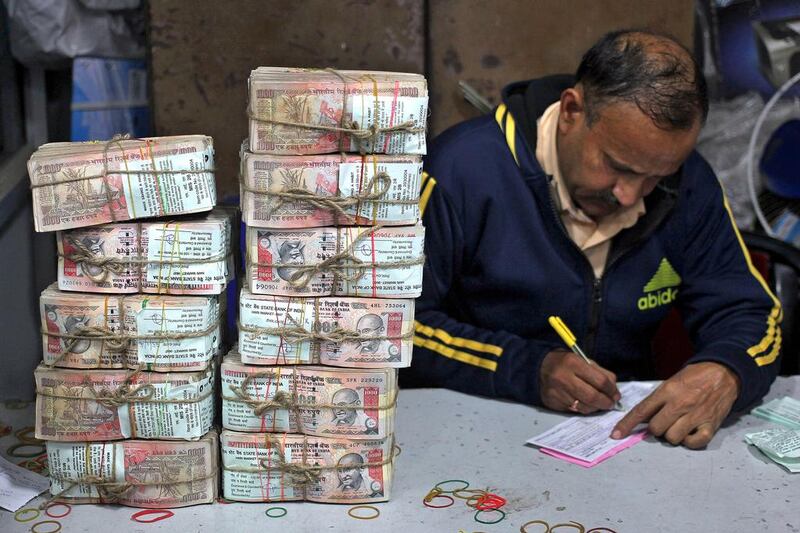“Never use a sledgehammer to kill a fly. The fly will escape and the table will break,” counselled my school principal, almost 50 years ago. As events unfolded in India after the demonetisation in November, I am reminded increasingly of his counsel.
The goal of demonetisation was to flush out black money. However, we need to comprehend the amount of illicit money in the economy, how much of it demonetisation will release, the price the ordinary citizen, especially in the villages, is paying for this and whether the root causes of unaccounted wealth are being challenged.
The best estimate of unaccounted money in India by the World Bank is US$450 billion. Income tax raids reveal that much unaccounted wealth is converted to assets, such as property and gold.
Bloomberg News reported this week that as of December 3, Indians had deposited $185bn of the affected banknotes into bank accounts post-demonetisation, or 85 per cent of the total. These deposits principally consist of monies on which tax has been paid held at homes for emergencies or monthly expenses. The bulk of these monies will be drawn after the stringent restrictions on weekly withdrawals are discontinued.
The government had estimated that about 5 trillion rupees (Dh270.27 billion), or roughly 33 per cent of the 15.3tn rupees affected by demonetisation, would stay undeclared, Bloomberg reported. The government will plainly fall short of this goal.
The question is whether it is worth putting a billion people through long queues, cessation of economic activities, stoppage of trade and business, for a dent on the unaccounted money in the country. More than 70 people have died waiting in queues at banks to obtain new currencies. Most workers earn their wages in cash, the majority are daily wage earners. These vulnerable sections of society are now either unemployed or surviving on barter.
Moreover, the intense slowdown in economic activity will depress GDP in the next few quarters. Thus the very purpose of demonetisation may flounder, for it will not generate any significant funds for development.
Some day, Indians must review whether the current financial mayhem has been worth the marginal financial gains. Indians must also calculate the millions of man hours of national time squandered by millions of people standing in queues to change their currencies.
Though the government had sought 50 days to restore adequate currency, weeks after demonetisation most of the country is desperately cash short. The new 500 rupee note is available in patches. Considering the printing capacities of the four mints, it is estimated that the country may have currency normality by May next year.
The government transports fresh notes from four printing presses to 19 currency-issuing offices of the Reserve Bank, then to 4,100 currency chests in banks and finally to 130,000 bank branches and 200,000 ATMs. About 9,000 vans and 40,000 personnel are involved in this nightmarish logistic.
The government could have printed sufficient quantities of the new notes before demonetisation. You cannot launch a new product, new currency notes in this case, and then not have adequate inventories. Such a situation is a recipe for failure.
It will not be easy to wipe out black money completely from India. The agricultural sector, which contributes 15 per cent to the GDP, is tax free. These farm incomes are also expended in the country and frequently serve as a conduit to launder money.
A large part of India’s economy is informal – small shopkeepers, hawkers, small electricians, plumbers and others – whose incomes are less than the annual taxable level. Their unaccounted earnings also flow into the national income stream, but remain unaccounted.
Cash is king in India, constituting 95 per cent of transactions. Banking services cover only 32 per cent of the Indian population. Credit card payments constitute only 3 to 4 per cent of transactions. A third of the bank branches are in urban areas. Any hope that digital transactions can alleviate the penetrating pain in the countryside is a pipe dream, considering the scrawny banking penetration and infrastructure.
A significant portion of the unaccounted wealth is stashed in foreign banks abroad. The estimate of these hidden monies range from a meagre $10bn all the way to $1tn; in 2012, the central bureau of investigation estimated the amount at $500bn. The list of foreign bank account holders is reportedly with government agencies. However, there is a veil of silence on this issue.
The root of unaccounted wealth in India is political funding and expenditure. If any government is serious about eliminating illicit money from the economy, it should legislate that all political parties will accept donations by cheque or online only.
According to a report on NDTV television network, the BJP reportedly receives about 63 per cent of its donations in cash and the congress about 84 per cent. If cash flows of political parties are not fully accounted for, then the pot should not call the kettle black. Political parties should be required to publish audited accounts annually.
Demonetisation will put some pressure on the black money generators for a brief while only. In fact, the larger 2,000 rupee denomination bill will tempt them to hoard illicit monies again.
If demonetisation fails, the opposition will proclaim that it was a political gimmick to camouflage the non-delivery of promises pertaining to economic growth, generating jobs, smart cities etc.
For now, Indians are beggars for their own hard-earned and taxed monies. As they wait in queues, they also wonder whether their fundamental right to freedom guaranteed in the constitution, is being squashed in this current cash squeeze. Freedom is free access to your own tax-paid money to live.
The author is managing director of Aneja Management Consultants in Mumbai.
business@thenational.ae
Follow The National's Business section on Twitter





